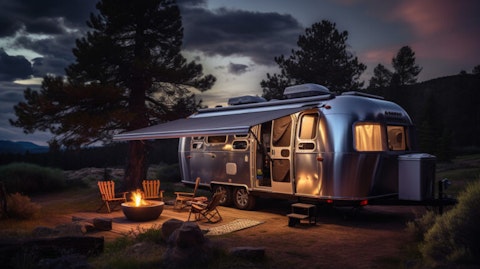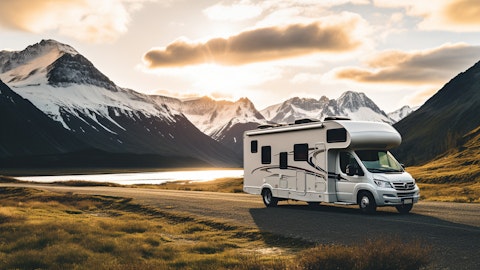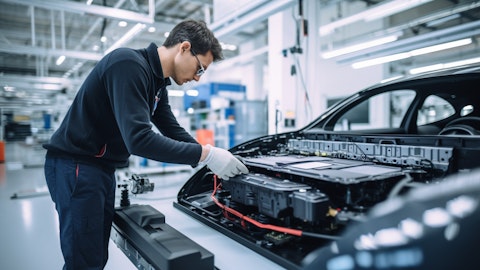We came across a bearish thesis on Winnebago Industries, Inc. (WGO) on Substack by Hunterbrook Media. In this article, we will summarize the bears’ thesis on WGO. Winnebago Industries, Inc. (WGO)’s share was trading at $61.64 as of Nov 6th. WGO’s trailing and forward P/E were 140.09 and 13.02 respectively according to Yahoo Finance.

A well lit Airstream RV parked in the outdoors, highlighting the recreational vehicles offered by the company.
Winnebago, a well-established manufacturer of recreational vehicles (RVs), is currently embroiled in a controversy surrounding its Grand Design RVs, specifically related to widespread frame failures affecting a large portion of its sales. These defects, particularly in the frames of the Grand Design models, involve bending beyond the intended limits, and in some cases, complete detachment from the trailer’s body. This structural failure has led to costly damages, and in some instances, the vehicles are rendered unsafe for use. The Grand Design brand, responsible for about 35% of Winnebago’s revenue, has seen significant challenges due to these issues, with some units suffering such severe damage that they risk being totaled. Winnebago has faced criticism for allegedly attempting to conceal these problems through tactics such as non-disclosure agreements (NDAs), buybacks, and suppression of online discussions, leading to accusations of consumer protection violations.
Legal experts and RV industry insiders have stressed the need for a formal recall, with repair shops indicating that a considerable percentage of Grand Design RVs show signs of frame damage. Independent inspections have confirmed that frame failures are prevalent across units, raising concerns about the safety and long-term viability of these products. Despite this, Winnebago has downplayed the situation, asserting that excessive frame flex is not a safety concern. However, actions such as suppressing negative online feedback and pressuring customers into silence suggest an attempt to control the narrative and avoid public scrutiny. The company’s reluctance to address these issues has led to a series of lawsuits, including claims that Winnebago’s warranty policies exploit legal loopholes to deny coverage for frame-related defects, further complicating the situation.
The surge in warranty claims, which have increased by 278% over the past six years, underscores the financial strain these defects are placing on Winnebago. The company has also experienced a decline in market share, particularly in the competitive towable RV market, as consumers seek alternatives due to concerns over Grand Design’s quality. Furthermore, Winnebago is contending with an inventory surplus at dealerships, signaling either over-shipping or under-selling of its RVs. In addition, the company has faced talent loss, with key employees leaving for a competitor, Brinkley RV, potentially impacting Winnebago’s ability to innovate and maintain product quality.
Despite these challenges, Winnebago has continued to downplay the severity of the issue. CEO Michael Happe, during an earnings call, dismissed the allegations of widespread defects. However, behind closed doors, the company’s actions to suppress negative feedback indicate a deeper crisis. As legal, financial, and reputational risks continue to escalate, the company’s response to these issues will significantly shape its future prospects. The symptoms of frame damage—loose bolts, creaky floors, or changes in towing behavior—can signal structural damage that, if left unaddressed, may render the RV unroadworthy.
For full-time RVers, the situation is particularly dire, as they face financial strain due to out-of-pocket repair costs and the lack of coverage for travel or lodging during extended repairs. Some owners have reported long wait times at authorized dealers and service centers, further exacerbating the situation. Despite Winnebago’s attempts to address these issues, many owners are forced to undergo repeated repairs, leaving them without their homes for extended periods. In some instances, owners have spent tens of thousands of dollars on repairs only to encounter further issues shortly thereafter.
Independent repair specialists and owner surveys suggest that the frame flex problem is far more widespread than Winnebago has acknowledged. Experts estimate that up to 70% of Grand Design RVs brought to repair shops show signs of frame failure, with many owners unaware of the severity of the issue. In some cases, owners have been forced to handle repairs themselves due to the lack of timely solutions from the company. This widespread frame failure problem highlights deeper issues within the RV industry, especially in the wake of the pandemic’s surge in RV demand. As manufacturers scrambled to meet the increased demand, quality control suffered, leading to a rise in frame failure complaints from 2020 onwards.
Models such as the Grand Design Solitude and Momentum, have been marketed as durable and capable of withstanding full-time use. However, experts argue that they were not designed to handle the stresses of frequent travel and long-term living, leading to structural failures. Winnebago has faced criticism for over-selling these models, which are often advertised as more durable than they are in reality.
In addition to the growing number of complaints, Winnebago’s warranty provisioning has become a financial concern. Warranty claims have surged, but the company has failed to adequately provision for these rising costs. In 2023, Winnebago’s warranty provision dropped significantly, leaving its warranty reserve insufficient to cover current claims. If the company had maintained its 2022 provisioning rate, it would have set aside an additional $16.8 million for warranty expenses, exposing potential future financial strain. Furthermore, the loss of key employees to Brinkley RV, a fast-growing competitor, has weakened Winnebago’s competitive position. With increased competition and internal scrutiny, Winnebago must address its warranty provisioning issues and stem the loss of talent to maintain its market position. If the company fails to act decisively, it risks further reputational damage and financial strain.
The bearish thesis on Winnebago centers on widespread frame failures in its Grand Design RVs, mounting warranty claims, and inadequate provisions for rising repair costs. The company’s failure to address quality issues, suppressing feedback, talent loss, and declining market share to competitors like Brinkley RV exacerbate financial and reputational risks.
Please keep in mind that these aren’t Insider Monkey’s opinions, and we merely summarized the bears’ thesis in this article.
Winnebago Industries, Inc. (WGO) is not on our list of the 31 Most Popular Stocks Among Hedge Funds. As per our database, 19 hedge fund portfolios held WGO at the end of the second quarter which was 23 in the previous quarter. While we acknowledge the risk and potential of WGO as an investment, our conviction lies in the belief that some AI stocks hold greater promise for delivering higher returns, and doing so within a shorter timeframe. If you are looking for an AI stock that is more promising than WGO but that trades at less than 5 times its earnings, check out our report about the cheapest AI stock.
READ NEXT: 8 Best Wide Moat Stocks to Buy Now and 30 Most Important AI Stocks According to BlackRock.
Disclosure: None. This article was originally published at Insider Monkey.


